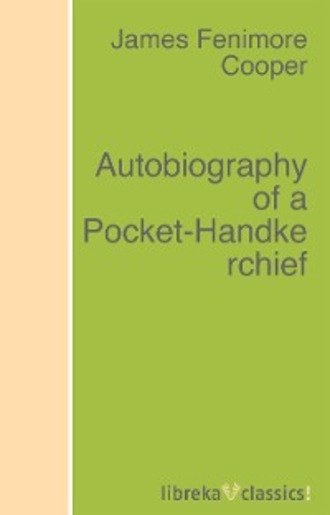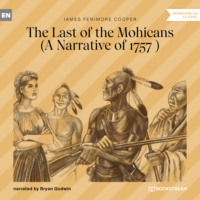
Полная версия
Autobiography of a Pocket-Handkerchief
{avenir = future; esprit = soul or vital spirit}
CHAPTER II.
It is scarcely necessary to dwell on the scenes which occurred between the time I first sprang from the earth and that in which I was "pulled." The latter was a melancholy day for me, however, arriving prematurely as regarded my vegetable state, since it was early determined that I was to be spun into threads of unusual fineness. I will only say, here, that my youth was a period of innocent pleasures, during which my chief delight was to exhibit my simple but beautiful flowers, in honor of the hand that gave them birth.
At the proper season, the whole field was laid low, when a scene of hurry and confusion succeeded, to which I find it exceedingly painful to turn in memory. The "rotting" was the most humiliating part of the process which followed, though, in our case, this was done in clear running water, and the "crackling" the most uncomfortable. Happily, we were spared the anguish which ordinarily accompanies breaking on the wheel, though we could not be said to have entirely escaped from all its parade. Innocence was our shield, and while we endured some of the disgrace that attaches to mere forms, we had that consolation of which no cruelty or device can deprive the unoffending. Our sorrows were not heightened by the consciousness of undeserving.
{"rotting" was... = to prepare flax for weaving as linen it is softened (technically, "retted") by soaking in water, separated from its woody fibers by beating ("scutched"—this seems to be what Cooper means by "crackling"), and finally combed ("hatcheled")}
There is a period, which occurred between the time of being "hatcheled" and that of being "woven," that it exceeds my powers to delineate. All around me seemed to be in a state of inextricable confusion, out of which order finally appeared in the shape of a piece of cambric, of a quality that brought the workmen far and near to visit it. We were a single family of only twelve, in this rare fabric, among which I remember that I occupied the seventh place in the order of arrangement, and of course in the order of seniority also. When properly folded, and bestowed in a comfortable covering, our time passed pleasantly enough, being removed from all disagreeable sights and smells, and lodged in a place of great security, and indeed of honor, men seldom failing to bestow this attention on their valuables.
{cambric = a fine white linen, originally from Cambray in Flanders}
It is out of my power to say precisely how long we remained in this passive state in the hands of the manufacturer. It was some weeks, however, if not months; during which our chief communications were on the chances of our future fortunes. Some of our number were ambitious, and would hear to nothing but the probability, nay, the certainty, of our being purchased, as soon as our arrival in Paris should be made known, by the king, in person, and presented to the dauphine, then the first lady in France. The virtues of the Duchesse d'Angouleme were properly appreciated by some of us, while I discovered that others entertained for her any feelings but those of veneration and respect. This diversity of opinion, on a subject of which one would think none of us very well qualified to be judges, was owing to a circumstance of such every-day occurrence as almost to supersede the necessity of telling it, though the narrative would be rendered more complete by an explanation.
{Dauphine = Crown Princess; Duchesse d'Angouleme = Marie Therese Charlotte (1778-1851), the Dauphine, daughter of King Louis XVI and wife of Louis Antoine of Artois, Duke of Angouleme, eldest son of King Charles X—she lost her chance to become queen when her father-in-law abdicated the French throne in 1830—Napoleon said of her that she was "the only man in her family"}
It happened, while we lay in the bleaching grounds, that one half of the piece extended into a part of the field that came under the management of a legitimist, while the other invaded the dominions of a liberal. Neither of these persons had any concern with us, we being under the special superintendence of the head workman, but it was impossible, altogether impossible, to escape the consequences of our locales. While the legitimist read nothing but the Moniteur, the liberal read nothing but Le Temps, a journal then recently established, in the supposed interests of human freedom. Each of these individuals got a paper at a certain hour, which he read with as much manner as he could command, and with singular perseverance as related to the difficulties to be overcome, to a clientele of bleachers, who reasoned as he reasoned, swore by his oaths, and finally arrived at all his conclusions. The liberals had the best of it as to numbers, and possibly as to wit, the Moniteur possessing all the dullness of official dignity under all the dynasties and ministries that have governed France since its establishment. My business, however, is with the effect produced on the pocket-handkerchiefs, and not with that produced on the laborers. The two extremes were regular cotes gauches and cotes droits. In other words, all at the right end of the piece became devoted Bourbonists, devoutly believing that princes, who were daily mentioned with so much reverence and respect, could be nothing else but perfect; while the opposite extreme were disposed to think that nothing good could come of Nazareth. In this way, four of our number became decided politicians, not only entertaining a sovereign contempt for the sides they respectively opposed, but beginning to feel sensations approaching to hatred for each other.
{bleaching grounds = open spaces where newly woven linen is spread to whiten in the sun; legitimist.... = this paragraph refers to controversies, before the French "July Revolution" of 1830, between rightist ("cote droit" = right side) legitimists, who read the official "Moniteur" newspaper and supported the absolutist Bourbon monarchy of King Charles X, and leftist ("cote gauche" = left side) liberals, who read "Le Temps" and argued for reform or revolution; "nothing good could come of Nazareth" = from the Bible, John, I, 46: "Can any good thing come out of Nazareth"}
The reader will readily understand that these feelings lessened toward the centre of the piece, acquiring most intensity at the extremes. I may be said, myself, to have belonged to the centre gauche, that being my accidental position in the fabric, when it was a natural consequence to obtain sentiments of this shade. It will be seen, in the end, how prominent were these early impressions, and how far it is worth while for mere pocket-handkerchiefs to throw away their time, and permit their feelings to become excited concerning interests that they are certainly not destined to control, and about which, under the most favorable circumstances, they seldom obtain other than very questionable information.
{centre gauche = center left, i.e., moderate left}
It followed from this state of feeling, that the notion we were about to fall into the hands of the unfortunate daughter of Louis XVI excited considerable commotion and disgust among us. Though very moderate in my political antipathies and predilections, I confess to some excitement in my own case, declaring that if royalty WAS to be my lot, I would prefer not to ascend any higher on the scale than to become the property of that excellent princess, Amelie, who then presided in the Palais Royal, the daughter and sister of a king, but with as little prospects as desires of becoming a queen in her own person. This wish of mine was treated as groveling, and even worse than republican, by the cote droit of our piece, while the cote gauche sneered at it as manifesting a sneaking regard for station without the spirit to avow it. Both were mistaken, however; no unworthy sentiments entering into my decision. Accident had made me acquainted with the virtues of this estimable woman, and I felt assured that she would treat even a pocket-handkerchief kindly. This early opinion has been confirmed by her deportment under very trying and unexpected events. I wish, as I believe she wishes herself, she had never been a queen.
{daughter of Louis XVI = the dauphine, Marie Therese Charlotte, Duchesse d'Angouleme, mentioned above; Amelie = Marie Amelie (1782-1866), daughter of King Ferdinand IV of Naples, sister of King Francis I of The Two Sicilies—reluctantly became queen in France when her husband the Duke of Orleans seized the throne from Charles X on July 31, 1830, and was proclaimed King Louis Philippe of the French}






